The TRS-80 Applications Software Sourcebook
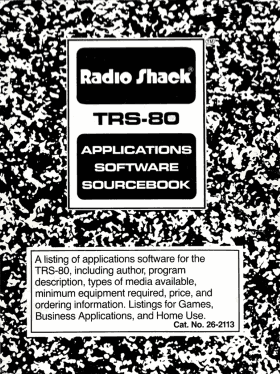
Cover of the first volume of the TRS-80 Applications Software Sourcebook
Any publisher could buy a listing in the TRS-80 Applications Software Sourcebook. A listing cost $10.00 and included the name of the program, the price, a short description, TRS-80 compatibility information, and ordering details. A listing could only mention one program and there were no discounts for multiple listings.
Listings
Radio Shack first announced the TRS-80 Applications Software Sourcebook in the March/April 1980 issue of the TRS-80 Microcomputer News:
Radio Shack is currently compiling a Software Sourcebook. The purpose of the Sourcebook is to make available a list of existing software for the TRS-80, both Model I and Model II.
The Sourcebook will provide you with Titles, Descriptions, Authors and Prices for TRS-80 application software. Radio Shack will NOT review this software and will make no representations as to its value or applicability to your needs. We are simply providing authors of software with a vehicle for getting information to TRS-80 users, as well as providing users with a way of getting information on available programs.
A listing could be placed in one of eight software categories:
- Games
- Education – Home
- Education – Classroom
- Statistics/Math
- Business/Accounting
- Business/Inventory Control
- Specific Industry/Profession
- Home/Personal Use
Each program listed in the TRS-80 Applications Software Sourcebook could only appear in one category and could only mention compatibility with two TRS-80 computers1. If a program was compatible with more than two TRS-80 models or fit in more than one category, then the only solution for a publisher was to buy multiple listings.
One category of software Radio Shack didn’t allow in the TRS-80 Applications Software Sourcebook was system software. This meant you couldn’t find any disk operating systems, assemblers, disassemblers, or debuggers.
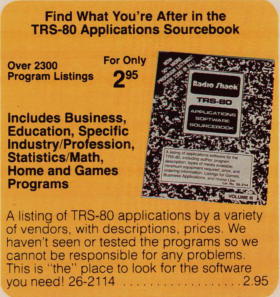
Advertisement for the TRS-80 Applications Software Sourcebook from a 1982 Radio Shack catalog
Volumes
Radio Shack stated that the TRS-80 Applications Software Sourcebook would be published “periodically as needed.” The first volume (catalog number 26-2113) was published in late 1980. It had over 1,000 listings and cost $1.00.
The second volume (catalog number 26-2114) was published in 1981. It had over 1,500 listings and cost $1.95.
Volumes three through six shared the same 26-2114 catalog number and were published from 1981 to 1985. The number of listings increased from 2,300 in the third volume to 5,300 in the sixth volume. The price also increased from $2.95 to $6.99.
The seventh volume (catalog number 26-1378) was published in 1986 and cost $7.95. The number of listings in this volume decreased for the first time, from 5,300 to 2,500. This probably reflected the collapse of the TRS-80 software market.
The eighth and final volume (catalog number 26-0215) was published in 1987. It cost $7.95 and contained 2,800 listings.
There was also a United Kingdom specific version of the TRS-80 Applications Software Sourcebook. According to Creative Computing, a 1982 volume promised “over 500 UK program listings.”
Disclaimer
Each TRS-80 Applications Software Sourcebook contained a disclaimer stressing that Radio Shack had not reviewed the programs listed inside. Here is the disclaimer from the first volume:
Since Radio Shack has not examined nor tested the programs offered by other persons, firms, or companies, it makes no warranties or recommendations, express or implied, with respect to these non-Radio Shack programs, including, but not limited to: availability, accuracy, reliability, capacity of software or hardware, performance, hardware requirements, or whether such programs are merchantable and fit for the purposes for which they were intended.
This didn’t stop Radio Shack from being sued on at least one occasion by a customer who had problems with third-party software listed in the TRS-80 Applications Software Sourcebook. Despite the disclaimer, Radio Shack lost that case.
Legacy
Despite Radio Shack’s intentions, the TRS-80 Applications Software Sourcebook represented only a tiny fraction of the third-party programs available for the TRS-80. Only a few companies, most notably Instant Software and Radio Shack itself, listed large numbers of their programs. Most of the popular TRS-80 programs were never listed at all. The books were essentially, as one Hot CoCo magazine reviewer put it, “a listing of classified ads.” But until Radio Shack created their Express Order Software service in 1984, they were the only way for customers to find out about third-party software from within a Radio Shack store.
-
At the time of the first TRS-80 Applications Software Sourcebook, the TRS-80 Model I and Model II were the only options. By the fourth, they had expanded to the Model I, Model II/16, Model III, Color Computer, and Pocket Computer. ↩︎
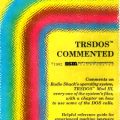
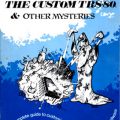
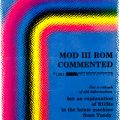
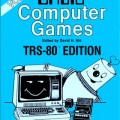










David Sutherland says:
Does anyone have the list of titles that were available in the Express Order Software Service?
I would much like to get a copy of that data.
Matthew Reed (TRS80.org) says:
One source for Express Order information is the 1986 Radio Shack Software Reference and Tandy Computer Guide. It lists 600 programs, many of which were Express Order:
https://archive.org/details/radio-shack-software-reference-and-tandy-computer-guide-1986
Doug Anderson says:
I remember getting a couple of these software source books.
I just downloaded and looked over that 1986 software reference. It is a gold mine of history. It lists programs like CrossTalk, pfs:report, pfs:write, SCRIPSIT, Lattice C compiler, Let’s C, PrintMaster, LDOS, DeskMate, dBase II/III, etc. It would be impossible to put together such a listing of software available today.
The second half of the guide has my favorite thing to look at in old print: advertisements! The prices, if adjusted for inflation, should remind one of how commoditization has brought computing to the masses. We were all early adopters and paid for it, literally.